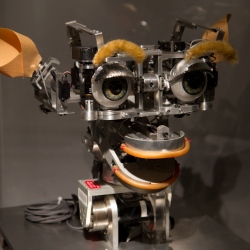
Japanese prime minister Shinzo Abe declared his intention to create a task force to study and propose strategies for tripling Japan’s robotics industry to $24 billion. And one more thing, Abe said, “In 2020, I would like to gather all of the world’s robots and aim to hold an Olympics where they compete in technical skills.”
While mere mortals compete in the 2020 summer Olympics in Tokyo, in a stadium somewhere nearby, the world’s most advanced robots may go head to head in events showcasing their considerable prowess (hopefully by then, right?). Holding an all-robot competition is by no means a new idea. A number of competitions exist. These range from fun (RoboCup and RoboGames) to serious (the DARPA Robotics Challenge). And recently, a Swiss group announced they’ll host a 2016 Olympics of robotically enhanced humans called Cybathlon.
Incentivized competitions can lead to advancements. The Ansari X PRIZE or DARPA Grand Challenge in autonomous cars, for example, whipped up excitement, real improvements, and the teams competing went on to form more permanent projects.
